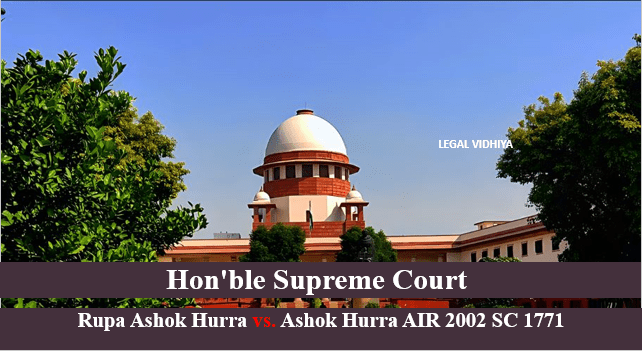
| Citation | AIR 2002 SC 1771 |
| Date of judgment | 10/04/2002 |
| Court | Supreme Court of India |
| Appellant | Rupa ashok hurra |
| Respondent | Ashok hurra |
| Bench | S.P.Bharucha Cji, S.S.M.Quadri, U.C.Banerjee, S.N.Variava, S.V.Patil |
| Referred | articles 132[3], 133[4] and 134[5] |
Keywords
mutual support, constitutional scheme.
Facts of the case
The Rupa Hurra vs. Ashok Hurra case is well-known for marital discord. Still, when the issue of the legitimacy of a divorce decree came before the Honourable Supreme Court of India and the lady produced her consent that she agreed to while surrendering to divorce through mutual support, significant legal questions arose.
Issues raised
Regardless of whether an aggrieved person is eligible for any relief against a previous judgment or request of the Supreme Court, either under Article 32 or otherwise?
Arguments
Mr. Shanti Bhusan learned senior Counsel appearing for the petitioner (the wife), argued and also submitted that the principle of the supreme court’s finality of decision under 32 should be removed, which means that the council insisted on the apex court’s finality of decision under 32 being removed in cases where the orders were passed without jurisdiction or in violation of the principles of natural justice and fundamental rights. It also applies in circumstances where there has been a blatant injustice.
On the other hand, the Learned Attorney-General, who was acting as an amicus curie in this case, took an uncommon approach to stating that the aggrieved person should be given an opportunity even after the procedure under Article 135 has been exhausted. They should be allowed to see relief in cases when there is a flagrant abuse of the court’s procedure or a miscarriage of justice, guaranteeing that the party has no alternative place to seek justice. Despite sitting as an amicus curiae, the attorney-general for the court was of the opinion that the injured party should be given justice.
Decisions taken / judgment
- In the concepts of Habeas Corpus, Quo Warranto, Mandamus, Prohibition, and Certiorari, Article 32 invokes writ jurisdiction. In terms of writ jurisdiction, it is structured similarly to the High Courts of India and the Court of Kings Bench in England. It is a well-established norm that details concerning the right of writs in English law have no bearing on our constitutional scheme.
- Nonetheless, it is critical to note that a better court than a sub-par court grants a writ of certiorari to call for records and look at something quite similar for passing a valid request, which ensures the record for evaluation.
- After carefully reviewing the documented foundation and the concept of writ jurisdiction, which is superior to sub-par courts and councils, the court concluded that a writ of certiorari cannot be granted to co-ordinate courts, much less to prominent courts.
- However, the jurisdiction and orders of a High Court are subject to revision by the Supreme Court in its appellate jurisdiction under Articles 132[3], 133[4], and 134[5], and the High Courts are not established as substandard courts in our constitutional scheme.
- As a result, the Supreme Court would not grant a petition under Article 32 to a High Court. Furthermore, neither a smaller nor a larger Supreme Court Bench can issue a writ under Article 32 to another Supreme Court Bench. We might also remark that the common courts of justice do not fall under the purview of “state” or “other specialists” under Article 12[7] of the Constitution.
Conclusions
The Rupa Hurra vs. Ashok Hurra decision was a watershed moment in the field of judicial scrutiny. This case reinforced that the courts in this country, particularly the highest judicial body, the Honourable Supreme Court, will look into every possibility to provide justice to individuals.
The court will go to any length to satisfy the disputants that justice has been served, regardless of whether it intends to revisit its own ruling in the future.
This article is written by Prakriti Mitra, techno India university, Intern of legal Vidhya




0 Comments